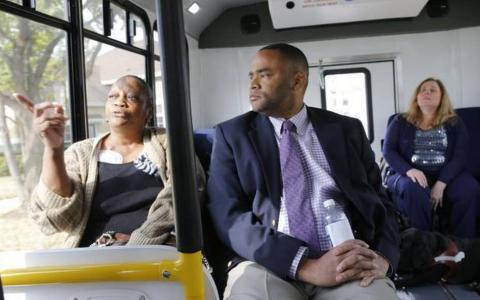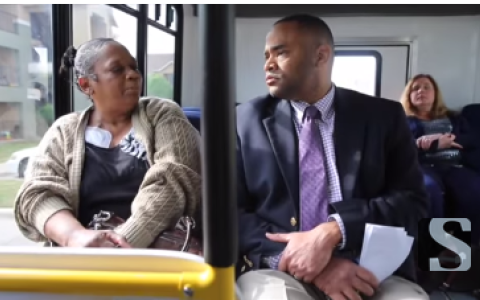Bill by Veasey would restore funding to transit services for elderly, disabled

Ruth Raggs talks with U.S. Rep. Marc Veasey as they ride together on a Handitran bus, in Arlington on Thursday. Veasey has proposed legislation that would restore hundreds of thousands of dollars in federal grant funding to three North Texas cities that provide low-cost transportation services to the elderly and disabled. RODGER MALLISON STAR-TELEGRAM
Click here to watch Star Telegram Video on Ride Along

U.S. Rep. Marc Veasey has proposed legislation that would restore hundreds of thousands of dollars in federal grant funding to three North Texas cities that provide low-cost transportation services to the elderly and disabled.
"Those of us who can move around freely, we really take it for granted that we can leave the house when we want to, that we can go to the grocery store or the doctor's office when we want to," Veasey, a Democrat whose 33rd District stretches from Fort Worth to Dallas, said while visiting Arlington's Handitran office this week. "There are many Americans that live right here in the Dallas-Fort Worth Metroplex that do not have that ability. These services, they count on them to be able to function and be able to have some sort of normalcy in their life."
Legislation in 2012 eliminated an exception that for years had allowed Arlington, Grand Prairie and Mesquite to receive Federal Transit Administration grants that subsidized fuel, bus driver salaries and other operating expenses. For the past three years, the North Central Texas Council of Governments' Regional Transportation Council has covered the funding gap while cities seek a more permanent solution.
That temporary funding, about $655,000 for Handitran, $262,000 for Grand Prairie's Grand Connection and $250,000 for Mesquite's Transportation for the Elderly and Disabled, isn't guaranteed for expenses that occur beyond Sept. 30.
Arlington city leaders said Veasey's bill, if made into law, would help provide financial stability for the 20-year-old Handitran service, which has nearly 16,000 eligible riders.
"The legislation would mean the world. A long-term operational funding source for Handitran would allow us to actually plan for the future," Transit Manager Bob Johnson said. "We would not necessarily be able to expand services, but we could provide some level of assurance to our riding public that we are a resource they can tap into for their transportation needs."
The Transportation for Elderly and Disabled Individuals Act of 2015, or HR1645, has been referred to the Transportation and Infrastructure Committee.
Veasey acknowledges that competition for transportation funds is fierce but said these types of transit services are critical for communities.
"Transportation and infrastructure in our country is woefully underfunded," Veasey said. "It's not easy, but we are going to do everything we can, because a city the size of Arlington needs transportation to be able to help people who are elderly, people who are disabled to get around."
Last fiscal year, Handitran provided 124,000 one-way trips to its riders, who pay $2 per trip or $55 per month. The city hasn't raised the fare, which generates about $215,000 of Handitran's $2.6 million budget, since 2006. The rest of the program's funding comes from state and federal grants and the city's tax-supported general fund.
"It's a critical service," Deputy City Manager Gilbert Perales said. "The fact that we don't have mass transit makes it almost imperative we provide something for those citizens who can't leave the house. Otherwise they are locked in with no means to get to the doctor or pharmacy or even just grocery shopping."
The Arlington program, which runs up to 14 buses at a time, serves more than just its own residents. Handitran's service operates up to 1.5 miles outside city limits, meaning residents in surrounding cities may be eligible if their trip originates in or ends in Arlington, Perales said.
"This is really a regional program. It encompasses all the cities that surround us," he said. "We have about 200 square miles that we provide service to with a limited capacity of buses."